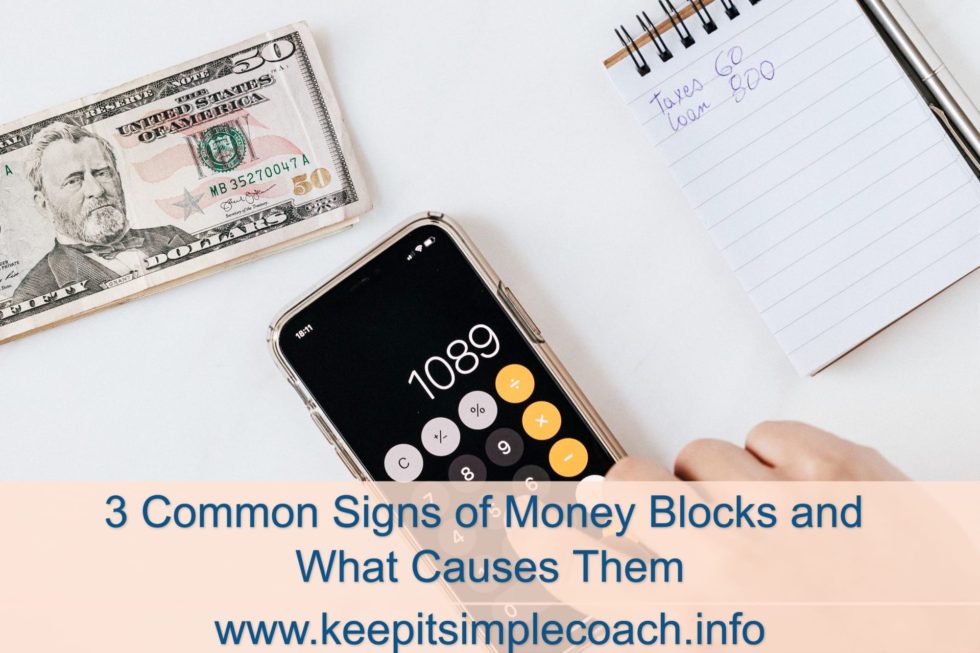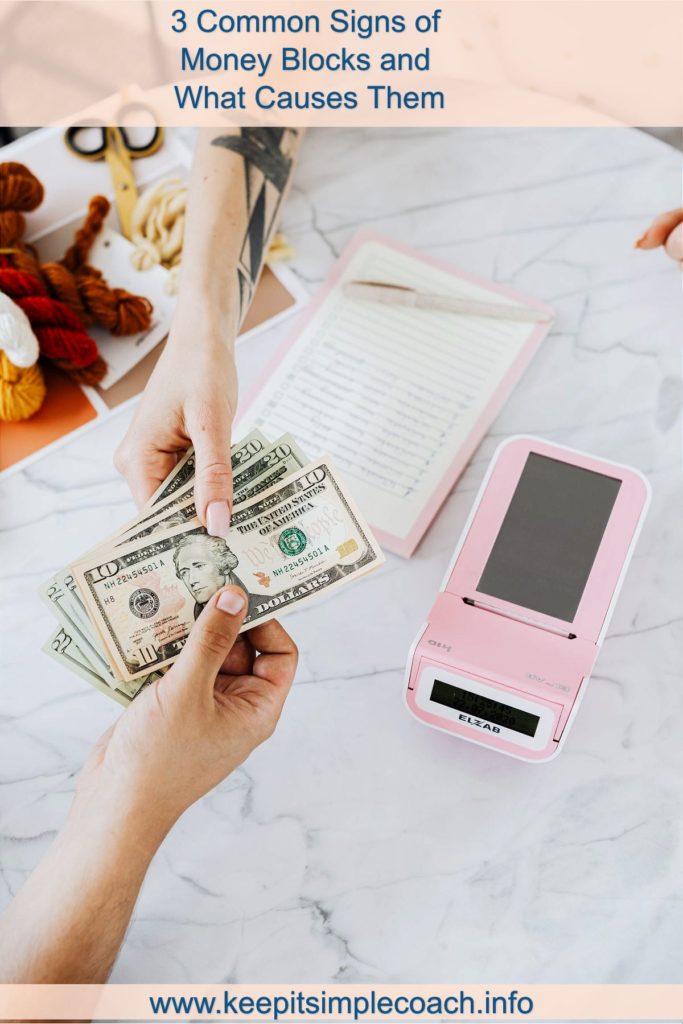
3 Common Signs of Money Blocks and What Causes Them
Tina struggled with money all of her life. First, as a child growing up in poverty then as a single teenage parent. When she started her online business, she thought the money troubles would finally end.
But three years later, she was still dealing with recurring money problems. It wasn’t until a business friend pointed out that she had “money blocks”. Money blocks are issues managing to get and keep the money.
Table of Contents
Here are three common signs of money blocks…
Frequent Feelings of Jealousy and Bitterness
You go to the mall and see another customer buying the beautiful dress you wanted. You feel a pang of disappointment or jealousy.
You see your friend taking her kids to Disney World for summer vacation while your family is struggling just to keep food on the table. You feel angry and bitter whenever you think about it.
These feelings are understandable. It’s frustrating to struggle with money when it seems like everyone else has it so good. Acknowledge these feelings when you encounter them but don’t focus on your feelings.
Negative feelings hurt you in the long-run and make it harder for you to improve your own money situation because you’re so busy keeping score.
Hoarding What You Do Have
When they hear the word ‘hoarding’, most people think of houses filled to the brim with useless items. But some types of hoarding are less obvious than that.

It might be that you’re holding onto a closet full of old clothes because you’re afraid you might need them at some point. It could be that you keep things—even broken things—because you think you’ll find a use for them some day.
This type of hoarding doesn’t interfere with your daily life, but it does affect your relationship with money. You’re subconsciously sending yourself the message that you don’t have enough, and you never will.
Instead of living in beautiful abundance and trusting that you’ll have enough to meet your needs as they come, you’re closely guarding your things.
Refusing to Invest in Yourself
Often, solopreneurs and small business owners reach a plateau. A plateau is a point where you can go no further in your business or in your life unless you invest in yourself first.
It might be that you’re a motivational speaker but you’re only getting booked for small events. You want to speak to bigger crowds in larger venues. You could continue to struggle for a few years, or you could invest in yourself. Hire a coach to help you grow your speaking business. Book a session with a speaking consultant to ask for advice.
So, now that you’re familiar with the signs of money blocks, it’s time to examine the causes of money blocks. After all, understanding your money blocks is essential to overcoming it…
It’s Generational
For better or worse, families impact our relationships with money. If you grew up in a home where money was scarce, your attitude toward money may reflect that. You might constantly worry about money and stress over everyday spendings, like buying groceries.
You look for the cheapest option (even if it isn’t the best value) and you focus on how everyone is trying to make money from you (the government, the big corporations, the health care system, etc.).
There’s nothing wrong with being frugal and wisely considering your budget. But there is a problem when you adopt a poverty mentality.
You can struggle with a poverty mentality even if you’re in a great job and make plenty of money. This is because your attitude toward money is steeped in the belief that there’s only so much to go around. As a result, you hold onto your money tightly.
It’s About the Hardship
Sometimes, people experience financial advice because someone else made poor choices. For example, if your spouse walked out on you and your kids, you may struggle to pay the bills on a single-parent income. Maybe your business partner embezzled money from your company.
No matter what your struggle is, you didn’t cause it. It’s understandable to be angry in situations like these. You were wronged and you deserve justice. But if you become bitter over the injustice, it clouds your thinking.
You begin to tell yourself that you’re a financial victim and that things will always be like this. But your situation can’t improve until you’re open to improvement. As long as you think of yourself as the victim, you’ll have a hard time developing a healthy money mindset.
It’s Your Friends

You and your friends get together and eventually, the topic of money comes up. You and your friends complain about the cost of your favorite services, outsourcing, and taxes. Then the conversation turns to all of the things you can’t do – afford that fancy vacation, send your kids to that private school, buy a big house, etc.
Before you know it, the conversation is over, and you’re left feeling horrible. The reason you feel bad is because you spent the past hour focused on everything you don’t have and can’t afford. That’s because a poor money mindset is contagious. The people you surround yourself can help you achieve all of your financial goals or…they can hinder you.
It’s About Confidence
Sometimes, a poor money mindset can be traced back to a lack of self-confidence. Maybe you had a business coach that told you that your ideas are stupid.
Perhaps you don’t understand what certain financial terms mean. Rather than tackling these issues, you try to avoid money altogether, so you worry that you’re spending it wrong. You don’t think you have the intelligence to set up a budget or save for retirement.
If you suspect your lack of self-confidence is affecting your money management, then you need to reach out to someone else. Don’t be afraid to buy a book on budgeting or take an online course about retirement funds.
It’s time to take control of your money and develop a healthy money mindset. You can start this process by discovering what’s holding you back and actively working to let go of your toxic money beliefs.
Embrace A Radical Mindset Shift…
Some people have heard the expression that “money is the root of all evil”. As a result, you might feel guilty or unworthy when you have money. But instead of thinking of money as something evil, think of it as a tool.
Just like you can use a shovel to dig up tree roots, you can also use it to plant the seed that becomes a tree. When you repeat this affirmation, imagine yourself planting seeds of abundance in the garden of your life.

Choose to adapt a new attitude around money. Say to yourself, “Money is the tool I use to create a life I love.”
Then set about making that happen! Maybe this means creating a fund so you can begin outsourcing business tasks you don’t enjoy or finding a way to attend that business conference you’ve always wanted to go to.
When you open yourself to the idea that money is all around you, then you begin to attract what you want. Regardless of where you come from or what you’ve gone through, you can overcome money blocks and re-write your money story!
Hey, share your thoughts and ideas directly in the comments. You never know how your words will connect with others that visit my site. Remember, being a business owner doesn’t mean you have to do it alone 🙂




